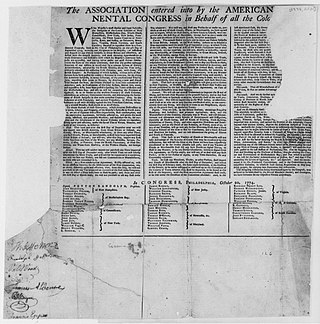Signers
Signers and objectors can be found in Historical record to the close of the nineteenth century of Rockland County, New York. Ed. by Arthur S. Tompkins. Nyack, N.Y., Van Deusen and Joyce, 1902: pages 93-97. https://babel.hathitrust.org/cgi/pt?id=loc.ark:/13960/t7xk8n73f&seq=105
See also
- Continental Association, adopted by the First Continental Congress on October 20, 1774
- Non-importation Act, passed by the United States Congress in 1806
Related Research Articles

Peyton Randolph was an American politician and planter who was a Founding Father of the United States. Born into Virginia's wealthiest and most powerful family, Randolph served as speaker of Virginia's House of Burgesses, president of the first two Virginia Conventions, and president of the First Continental Congress. He also served briefly as president of the Second Continental Congress.

Orangetown is a town in Rockland County, New York, United States, located in the southeastern part of the county. It is northwest of New York City, north of New Jersey, east of the town of Ramapo, south of the town of Clarkstown, and west of the Hudson River. The population was 48,655 at the 2020 census.

Tappan is a hamlet and census-designated place in the town of Orangetown, New York, United States. It is located northwest of Alpine, New Jersey, north of Northvale, New Jersey and Rockleigh, New Jersey, northeast of Old Tappan, New Jersey, east/southeast of Nauraushaun and Pearl River, south of Orangeburg, southwest of Sparkill, and west of Palisades; Tappan shares a border with each. The population was 6,673, according to the 2020 census.

The Boston Port Act, also called the Trade Act 1774, was an Act of the Parliament of Great Britain which became law on March 31, 1774, and took effect on June 1, 1774. It was one of five measures that were enacted during the spring of 1774 to punish Boston for the December 16, 1773, Boston Tea Party.

The Olive Branch Petition was adopted by the Second Continental Congress on July 5, 1775, and signed on July 8 in a final attempt to avoid war between Great Britain and the Thirteen Colonies in America. The Congress had already authorized the invasion of Canada more than a week earlier, but the petition affirmed American loyalty to Great Britain and entreated King George III to prevent further conflict. It was followed by the July 6 Declaration of the Causes and Necessity of Taking Up Arms, however, which made its success unlikely in London. In August 1775, the colonies were formally declared to be in rebellion by the Proclamation of Rebellion, and the petition was rejected by the British government; King George had refused to read it before declaring the colonists traitors.

The Second Continental Congress was the late 18th-century meeting of delegates from the Thirteen Colonies that united in support of the American Revolution and the Revolutionary War, which established American independence from the British Empire. The Congress constituted a new federation that it first named the United Colonies, and in 1776, renamed the United States of America. The Congress began convening in Philadelphia, on May 10, 1775, with representatives from 12 of the 13 colonies, after the Battles of Lexington and Concord.

The Continental Association, also known as the Articles of Association or simply the Association, was an agreement among the American colonies adopted by the First Continental Congress in Philadelphia on October 20, 1774. It was a result of the escalating American Revolution and called for a trade boycott against British merchants by the colonies. Congress hoped that placing economic sanctions on British imports and exports would pressure Parliament into addressing the colonies' grievances, especially repealing the Intolerable Acts, which were strongly opposed by the colonies.

The Suffolk Resolves was a declaration made on September 9, 1774, by the leaders of Suffolk County, Massachusetts. The declaration rejected the Massachusetts Government Act and resulted in a boycott of imported goods from Britain unless the Intolerable Acts were repealed. The Resolves were recognized by statesman Edmund Burke as a major development in colonial animosity leading to adoption of the United States Declaration of Independence from the Kingdom of Great Britain in 1776, and he urged British conciliation with the American colonies, to little effect. The First Continental Congress endorsed the Resolves on September 17, 1774, and passed the similarly themed Continental Association on October 20, 1774.
John Haring was an American lawyer from New York. During his long political career, he was a delegate to the First Continental Congress and Congress of the Confederation, served as president pro tempore of the New York Provincial Congress, served in both the New York State Legislature and New Jersey Legislature, and was a presidential elector.

The First Continental Congress was a meeting of delegates of 12 of the Thirteen Colonies held from September 5 to October 26, 1774, at Carpenters' Hall in Philadelphia at the beginning of the American Revolution. The meeting was organized by the delegates after the British Navy implemented a blockade of Boston Harbor and the Parliament of Great Britain passed the punitive Intolerable Acts in response to the Boston Tea Party.

The Restraining Acts of early 1775 were two Acts passed by the Parliament of Great Britain, which limited colonial trade in response to both increasing and spreading civil disobedience in Massachusetts and New England, and similar trade restrictions instituted by elected colonial representatives. With time the foment would spread to most of its American Colonies. The first restraining act, known variously as the New England Trade And Fisheries Act, the New England Restraining Act, or the Trade Act 1775, limited the export and import of any goods to and from only Great Britain, Ireland, and the British West Indies; it also prohibited the New England colonies from fishing in the waters off Newfoundland and most of America's Atlantic coast, without special permissions and documentation, and imposed stiff penalties on both perpetrators and administrators if violations occurred. Previously legal or finessed trade between the colonies themselves or with other nations was prohibited, and enforced by naval blockade, effective July 1, 1775. The second restraining act, known also as the Trade Act 1775, similarly limited the export or import of any goods by way of only Great Britain, Ireland, and the British West Indies for most colonies south of New England; it was passed shortly after the first, upon receiving news in April that the colony's trade boycott had spread widely among other colonies. New York, Delaware, North Carolina and Georgia would escape these restraints on trade, but only for a few months.
The Fairfax Resolves were a set of resolutions adopted by a committee in Fairfax County in the Colony of Virginia on July 18, 1774, in the early stages of the American Revolution. Written at the behest of George Washington and others, they were authored primarily by George Mason. The resolutions rejected the British Parliament's claim of supreme authority over the American colonies. More than thirty counties in Virginia passed similar resolutions in 1774, "but the Fairfax Resolves were the most detailed, the most influential, and the most radical."
The Fincastle Resolutions was a statement reportedly adopted on January 20, 1775, by fifteen elected representatives of Fincastle County, Virginia. Part of the political movement that became the American Revolution, the resolutions were addressed to Virginia's delegation at the First Continental Congress, and expressed support for Congress' resistance to the Intolerable Acts, issued in 1774 by the British Parliament.

The Conciliatory Resolution was a resolution proposed by Lord North and passed by the British Parliament in February 1775, in an attempt to reach a peaceful settlement with the Thirteen Colonies about two months prior to the outbreak of the American Revolutionary War. It allowed any colony that agreed to contribute to the public defense, as well as to support civil government and the administration of justice, as approved by the Crown and the two Houses of Parliament, to be exempt from taxation. Taxes for the regulation of commerce would continue to be levied, but their net produce would be returned to the colony. The resolution arrived in the United States after war had broken out in Massachusetts, and was rejected by the Continental Congress.

The Petition to the King was a petition sent to King George III by the First Continental Congress in 1774, calling for the repeal of the Intolerable Acts. The King's rejection of the Petition, was one of the causes of the later United States Declaration of Independence and American Revolutionary War. The Continental Congress had hoped to resolve conflict without a war.

The '76 House, also known as the Old '76 House, is a Colonial-era structure built as a home and tavern in Tappan, New York, in 1754 by Casparus Mabie, a merchant and tavern-keeper.

The Michael Salyer Stone House is located on Blue Hill Road in Orangetown, New York, United States. It was built in the late 18th century.

The Virginia Association was a series of non-importation agreements adopted by Virginians in 1769 as a way of speeding economic recovery and opposing the Townshend Acts. Initiated by George Washington, drafted by George Mason, and passed by the Virginia House of Burgesses in May 1769, the Virginia Association was a way for Virginians to stand united against continued British taxation and trade control. The Virginia Association served as the framework and precursor to the larger and more powerful 1774 Continental Association.

The 27 grievances is a section from the United States Declaration of Independence. The Second Continental Congress's Committee of Five drafted the document listing their grievances with the actions and decisions of King George III with regard to the Colonies in North America. The Second Continental Congress voted unanimously to adopt and issue the Declaration of Independence on July 4, 1776.
The First North Carolina Provincial Congress was the first of five extra-legal unicameral bodies that met beginning in the summer of 1774. They were modeled after the colonial lower house. These congresses created a government structure, issued bills of credit to pay for the movement, and organized an army for defense, in preparation for the state of North Carolina. This First Congress met in New Bern from August 25 to August 27, 1774. John Harvey served as president. These Provincial congresses paved the way for the first meeting of the North Carolina General Assembly on April 7, 1777 in New Bern, North Carolina.
References
- ↑ "Orangetown Resolutions". orangetown.com. Archived from the original on July 31, 2010 – via Wayback Machine.
- ↑ Knight, Robert (October 29, 1969). "History Notebook". The Journal News . White Plains, New York. p. 38. Retrieved January 28, 2024– via newspapers.com.
External links
- John Haring and the Orangetown Resolutions via YouTube
- Orangetown American Revolution Bicentennial at The Historical Marker Database